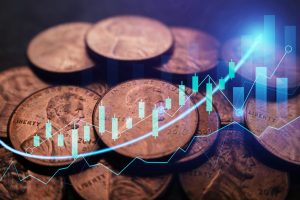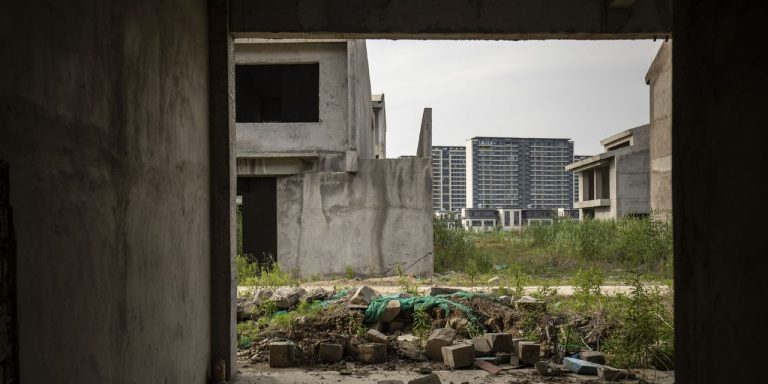China’s property developers are under duress again, re-igniting concerns about a debt crisis. But with a faltering economy and diminished confidence among households and companies, China debt watcher Charlene Chu, senior analyst at Autonomous Research, worries the ingredients are there for a broader financial crisis for the first time.
The country’s economic recovery from three years of strict Covid restrictions and crackdowns on its property and internet sectors appears to be losing momentum. The property sector, which holds 70% of Chinese households’ wealth, is ailing. Existing home prices slid 9% month over month in big cities in July, the steepest decline in a decade. Property developer
Country Garden Holdings
didn’t make a bond payment and financial products managed by Zhongrong International Trust missed payments to investors, feeding concerns about financial contagion.
Chu, a former Fitch Ratings analyst, has become a go-to source for understanding China’s opaque banking system and all things debt. We talked about whether the country is on the edge of a “Lehman” moment, and why she sees no easy fix to get China out of its predicament.
Barron’s reached Chu at her office in Washington, D.C. An edited version of our conversation follows.
Barron’s: How bad is the economic situation in China compared with other periods of trouble?
Charlene Chu: The macroeconomic climate is much worse than it’s ever been since reform and opening in the 1970s. It’s not just one issue, like the collapse of activity in the property sector. We have a cyclical and structural problem with weak exports, a confidence problem, and local governments, which were an important contributor of growth for China in the past as they were told to borrow money to prop up activity, focused this year on managing their ‘implicit debt burden.’ Essentially, they are saying they can’t borrow more because the central government is pressuring them.
Why can’t the Chinese government come in and bail out local governments?
They definitely have the scope to do it, with central government debt to GDP about 25% to 30%. But there’s an unwillingness to do that. They want to keep the central government’s balance sheet as pristine as possible. If they drew on the balance sheet to bail out developers and then the trust products, that scope [to help in the future] lessens. They have been adamant on this point for several years.
What else differentiates this current economic situation from the past?
The confidence problem is something we haven’t faced at this magnitude in a very long time. And as we saw in March with the U.S. regional banks, confidence is very important to the financial sector. The real risk we face in the coming months is if the macroeconomic situation doesn’t improve—and I don’t think it will—then we are stuck with confidence problems. Does it at some point spread to the financial sector such that people say they would feel safer with their money in bank deposits, not at a trust company?
Then, suddenly investment products—not just trusts—would potentially be in a run situation where they can’t roll over products because everyone says they want their money back. Zhongrong International Trust essentially said that it became difficult for them to issue new products. That is where [China] runs the risk of confidence in this shadow credit space creating a problem.
Is China vulnerable to a financial run similar to what U.S. regional banks experienced this spring with Silicon Valley Bank?
There isn’t an ability to redeem most investment products at will like there is with bank deposits, which is a key reason things remain quiet for now. What we don’t know is whether recent trust defaults have made investors more reticent to roll their investments over when they mature. If so, we are likely to see more defaults like Zhongrong and Zhongzhi. If not, the system can remain fairly quiet and stable.
The most pernicious form of a confidence issue spreading into the financial sector would be households and corporates not only deciding they would be more comfortable with their money in bank deposits but rather in deposits at state banks, which could trigger a migration of funding away from smaller banks akin to what we saw in the U.S. earlier this year. None of this is happening now, but the ingredients are there in a way they haven’t been before.
Is China on the edge of a Lehman moment?
We have had six trust companies fail over the last couple years and it didn’t create a systemic crisis. There’s nothing to say this one will trigger bigger problems. But Zhongrong is multiple times bigger, the economic climate is much worse, and we didn’t have the same confidence problem [before] so there are definite vulnerabilities.
The reason Lehman spread so fast and [everyone] was pulled in was a loss of confidence in banks about other banks. Everyone didn’t know how much everyone else was holding and who was on the verge of not being able to stand up the next day. We are not on the edge of a loss of that type of confidence of Chinese financial institutions in each other.
Because the banks are state-owned?
Yes. There are instances where they go down that path and [the government] calls all the key players into the room and they say nobody is cutting anyone off—because if they play that game the whole system has a problem.
What’s the risk to the global financial plumbing?
It’s very modest. Western institutions, especially in the wake of what happened in Ukraine, have all been reviewing what their exposure is and how they would manage big losses in any key markets.
What impact are higher U.S. interest rates having on China’s financial situation?
[The People’s Bank of China was] expected to cut rates by 15 basis points on the one-year this past week and only did 10 basis points. Everyone is focused on banks’ net interest margins, but the other issue is the very large gap between U.S. and Chinese interest rates. If China starts cutting rates more aggressively, that gap widens and [risks] capital outflows and more pressure on the renminbi. That’s acting as a constraint on the ability of authorities to be more aggressive on rate cuts.
How could Beijing rebuild confidence?
You could argue they should cut rates more dramatically—a couple hundred basis points, but this is where things get tricky with how much currency pressure they want and how much they want to erode banks’ net interest margins. Will they have problems if bank deposits go to zero and people take their money out and [move] into trust products and less safe investment products?
The hope is property will bottom and that this inventory destocking cycle [of goods and commodities] in the U.S. and Europe will bottom, and companies will restock, increasing export demand in 2024. But property could continue to be very lackluster. Maybe it flatlines at weak levels. And who knows what happens with inventory rebuilding in developed markets? If I was a Chinese corporation , I wouldn’t think about building inventory.
How worried should investors be about Chinese debt levels?
Total credit outstanding is up 8.5 times since 2008; GDP is up 3.9. Debt has risen to a significant margin, well above its resources. And if growth is going to be slowing, the resources to repay the debt will get thinner and thinner.
It’s interesting to see what is happening with household debt. People are prepaying. Chinese households have intuitively realized that they have hit the maximum amount of debt they can [handle]. Local governments are there too, especially if the central government is saying they have to work down this implicit debt. Local government debt didn’t exist in 2008, when it pushed through a 4 trillion renminbi stimulus. The real stimulus was that local governments could borrow for the first time; their debt went from zero to 90 to 100 trillion renminbi in 15 years.
Is China headed to its own version of Japan’s lost decades?
With a Chinese flavor, it is. China is a much bigger country with income levels much lower than Japan at the time and its demographic profile is deteriorating more rapidly. We are looking at a very difficult decade unless authorities can come out with something that is very aggressive on the structural reform side.
How aggressive?
One reason it’s so hard for China to move to a domestic-driven growth model is that they didn’t take the opportunity when things were going great to build out a comprehensive social safety net. The population is still bearing a higher cost for critical things than in the U.S. They have been talking about the need to lift incomes—and that will lift consumption—but not sure they can do that with all the pressure on corporations.
Where’s the biggest disconnect you see in the market?
People keep looking at this as a cyclical short-term problem and [think] China will get back to the growth path it was on, and everything will be fine. Those days are over. China is never going back to prepandemic growth levels. There are just too many structural issues. Then, layer on the demographics and it’s going to be impossible to get close to the growth rates of the past. People don’t understand that. It’s not clear China’s authorities fully understand that either as they keep emphasizing that it’s taken every other country time to rebound after reopening so people just need to be patient.
How bad will it get?
The growth picture has changed dramatically. There will be cyclical ups and downs when you can make money, but it’s absolutely in a structural decline in growth and at some point there’s a real risk where it hovers at barely positive levels of growth. The investment case has gotten much weaker for China, particularly with all the risks people are taking on when they are investing there.
Thanks, Charlene.
Corrections & amplifications: China implemented a 4 trillion renminbi stimulus after the global financial crisis that increased local government debt. An earlier version had it incorrectly denominated in dollars.
Write to Reshma Kapadia at [email protected]
Read the full article here









